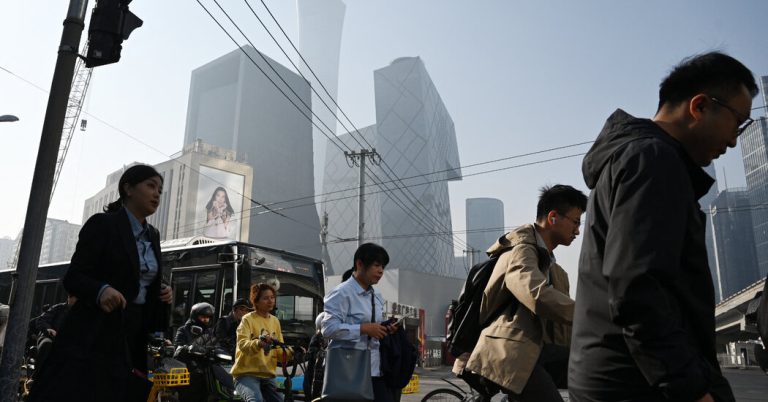
The show’s over.Credit…Rhona Wise for The New York Times
The FTX contagion spreads
The breadth of the global fallout from FTX’s collapse has continued to emerge. Temasek, Singapore’s state-backed fund, said on Thursday that it had fully written down its $275 million investment in the crypto exchange, joining the Silicon Valley firm Sequoia Capital and SoftBank, the Japanese tech conglomerate, in declaring their stakes worthless.
The development comes as Sam Bankman-Fried, FTX’s founder, delivered a series of bombshell admissions in a candid direct-message exchange with Vox’s Kelsey Piper. Among them: S.B.F., as Mr. Bankman-Fried is known, blamed “messy accounting” for the company’s losses, which could run into the billions.
Contagion fears are growing — and hitting notable investors. Mr. Bankman-Fried convinced Anthony Scaramucci, the founder of the investment firm SkyBridge Capital, to buy $10 million worth of FTT, the digital token of FTX, as a condition for Bankman-Fried to inject $45 million into SkyBridge in September, according to The Financial Times. FTT’s value has plunged by more than 90 percent over the past two weeks.
Is Genesis Global Capital, a big lender to crypto hedge funds, at risk? The firm faces $175 million in exposure to FTX and has hired the restructuring firm Alvarez & Marsel and the law firm Cleary Gottlieb as advisers as it faces a liquidity crunch. Genesis halted customer withdrawals and any new lending on Wednesday.
Why it matters: Genesis is owned by Digital Currency Group, one of the biggest players in the crypto industry. Founded by Barry Silbert in 2015, D.C.G. is a crypto conglomerate that owns dozens of companies, including the news site CoinDesk and the asset manager Grayscale Investments, which runs the world’s largest crypto fund. It’s also backed by big-name mainstream investors, including SoftBank’s Vision Fund 2 and Alphabet, the parent company of Google.
Shares of the Grayscale Bitcoin Trust have fallen 20 percent in the past two weeks, and are down 75 percent for the year.
Losses at Grayscale could run deep. Grayscale is where Bitcoin touches retail investors and Wall Street. Anyone could buy into Grayscale. Cathie Wood’s Ark Investment Management and dozens of other mutual funds are, or have been, holders of Grayscale investment products to get exposure to crypto assets.
Other firms are under pressure, too. The crypto exchange Gemini, which is owned by the Facebook-famous Winklevoss twins, temporarily halted some of its withdrawals on Wednesday.
FTX faces big legal challenges as investors seek justice. S.B.F. said on Twitter on Wednesday that he was wrong to think FTX held enough reserves to cover customer withdrawals, a possibly tantalizing admission.
David Boies, the prominent lawyer involved in some of the biggest cases in recent years, has signed on to represent FTX investors in a class-action lawsuit. They are seeking billions from not just Bankman-Fried, but also celebrity FTX promoters, including the comedian Larry David and the football player Tom Brady.
Lawmakers are also gearing up. Treasury Secretary Janet Yellen said on Wednesday that the crypto market needs more oversight, adding that the sector’s links to the broader financial system could cause wider stability issues. And the House Financial Services Committee will hold a hearing on the recent travails of the crypto market next month.
HERE’S WHAT’S HAPPENING
Republicans claim control of the House. The G.O.P. crossed the 218-seat threshold to win a majority in the chamber, but its hold remains far slimmer than it had hoped. A handful of races have yet to be called. Meanwhile, another prominent Republican donor, Ron Lauder, became the latest to say he wouldn’t back Donald Trump’s presidential run.
The U.K. government outlines its budget at last. The chancellor of the Exchequer, Jeremy Hunt, said millions more Britons would pay higher taxes, public spending would be cut sharply and already huge windfall taxes on energy companies would rise. The moves, he said, were aimed at shoring up Britain’s finances amid rising inflation and market turmoil exacerbated by the previous government’s plans for unfunded tax cuts.
Retailers are offering a cautiously optimistic economic picture. Retail sales rose 1.3 percent last month, the Commerce Department announced, surpassing expectations. But while that’s also been borne out by results at Walmart, Target cautioned that it was seeing spending slowdowns in discretionary categories like apparel heading into the holiday season.
Former SpaceX workers say they were fired for criticizing Elon Musk. Nine engineers said their dismissals were tied to the writing of a letter calling on the rocket company to condemn its C.E.O.’s “harmful Twitter behavior.” Eight of them filed charges of unfair labor practices with federal regulators over the matter. (More on Musk’s travails at another of his companies below.)
Dell agrees to a record $1 billion payout to settle a shareholder lawsuit. The tech giant’s proposed payment will end investor claims that Dell’s 2018 deal to go public was based on “coercive, strong-arm tactics.” If approved, the settlement would be one of the biggest ever in Delaware’s Court of Chancery.
S.B.F. said what?
Sam Bankman-Fried, the embattled founder of FTX, has already bewildered many by continuing to tweet about his crypto empire even as he faces potential investigations into its implosion. But in an eye-opening interview with Vox over Twitter direct messages, he spoke candidly about FTX’s fate, regulation, ethics and more. (S.B.F. later tweeted that he believed he was talking with a friend and didn’t intend for these to become public.)
Here are some of the highlights.
-
S.B.F. derided regulators with an expletive, adding, “They make everything worse. They don’t protect customers at all.” (He later tried to walk those comments back.)
-
He regretted having FTX file for bankruptcy protection: “If I hadn’t done that, withdrawals would be opening up in a month with customers fully whole.” Filing for Chapter 11 meant putting people in charge who “are trying to burn it all to the ground out of shame,” he wrote.
-
S.B.F. played down previous comments about the need to avoid unethical behavior even if it serves a greater good, lamenting “this dumb game we woke westerners play.” He also commented on the approval that Changpeng Zhao, an FTX investor-turned-rival who abandoned a deal to save S.B.F.’s firm, has gained in recent days: “Is it because he’s virtuous? Or because he had the bigger balance sheet.”
In a bankruptcy court filing on Thursday, lawyers for FTX criticized S.B.F.’s “incessant and disruptive tweeting.”
Is Elon Musk’s $50 billion payout justified?
On Wednesday at the trial over Elon Musk’s enormous pay package at Tesla, the electric carmaker’s C.E.O. took the stand to defend one of the most lucrative compensation plans in modern history, worth nearly $50 billion in stock option grants. And his hourslong appearance yielded new revelations about the future of both Tesla and Twitter.
Mr. Musk said he had no say over the pay package. The billionaire said he was focused on running the company and didn’t push the board — some of whom were also his social acquaintances — to do his bidding.
Tesla’s board has discussed finding a successor to Mr. Musk. One of its directors, the media scion James Murdoch, testified on Wednesday that Musk had recently suggested someone who could take over in the top role. But Antonio Gracias, who was a Tesla director until last year, said that while the board had discussed potential successors, it hadn’t found a suitable candidate.
Mr. Musk added that he had considered stepping down as C.E.O., while Gracias said the board felt it needed Musk to remain in the top spot.
Mr. Musk confirmed that his leadership of Twitter is temporary. “I expect to reduce my time at Twitter and find somebody else to run Twitter over time,” he testified. Musk admitted earlier this week that he had “too much work” on his plate. That is worrying Tesla shareholders, who think his attention is too divided among his many companies.
He played down Tesla engineers’ work at Twitter. “I think it lasted for a few days and it was over,” Musk said, describing the drafting of several Tesla software engineers to help at Twitter as “an after-hours” arrangement. Murdoch said the board’s audit committee was aware that Mr. Musk had asked Tesla engineers to work on a volunteer basis at Twitter.
Mr. Murdoch overall offered a robust defense of the Tesla chief: “Shareholders have been rewarded, frankly, in a historic fashion.”
Harvard and Yale challenge the school-ranking complex
It was one thing when Columbia announced over the summer that it wouldn’t participate in U.S. News and World Report’s rankings of top national universities, over doubts about data it had submitted for the influential listings.
But the one-two punch on Wednesday of Yale and Harvard withdrawing their law schools’ cooperation with the rankings was another thing altogether. Though ultimately limited in scope, the Ivy League institutions’ decisions could have further repercussions for the much-criticized — but widely followed — rankings.
Yale and Harvard argued that the U.S. News system was unreliable, based on self-reported data as well as publicly available figures. They added that the rankings devalued efforts to recruit less-well-off students, provide more need-based financial aid and encourage graduates to pursue public-service jobs. Critics also say the rankings overemphasize students’ grades and admission test scores.
It’s a small step, not a knockout blow. Yale and Harvard only withdrew their law schools’ cooperation, not that of their universities as a whole. U.S. News can still draw on publicly available data to rank schools.
But the move may persuade U.S. News to alter its methodology, particularly by discounting the importance of admissions test scores. “We agree that test scores don’t tell the full story of an applicant,” U.S. News said after the Yale and Harvard announcements.
THE SPEED READ
Deals
-
Tencent of China plans to distribute its $20 billion stake in Meituan, the meal-delivery giant, to its shareholders as a special dividend. (Bloomberg)
-
Paris’s stock market is close to overtaking London’s as the highest-valued equity hub in Europe. (FT)
-
Over 150 retired EY partners said the firm’s plans to spin off its consulting arm from its accounting operations could hurt both businesses. (FT)
-
Hollywood’s top two horror-movie producers, James Wan and Jason Blum, are in talks to merge their studios. (NYT)
Policy
-
One of the leading conservative dark-money groups in Washington received two anonymous gifts of $425 million each, among the biggest ever to political organizations. (Politico)
-
Karen Bass, a veteran Democratic congresswoman, defeated the billionaire businessman Rick Caruso to become the first woman elected as mayor of Los Angeles. (NYT)
-
A bill to provide federal protections for same-sex marriage advanced in the Senate with bipartisan support. (NYT)
Best of the rest
-
As Silicon Valley companies like Meta and Twitter lay off employees, TikTok is moving to scoop them up. (The Information)
-
Nick Jones, the founder of the Soho House members’ club, is stepping down as C.E.O. after being diagnosed with prostate cancer. (FT)
-
First, Taylor Swift fans hoping for tickets for her latest tour crashed Ticketmaster’s website. Now tickets are hitting $28,000 on the secondary market. (Reuters)
Thanks for reading! We’ll see you tomorrow.
We’d like your feedback! Please email thoughts and suggestions to dealbook@nytimes.com.






